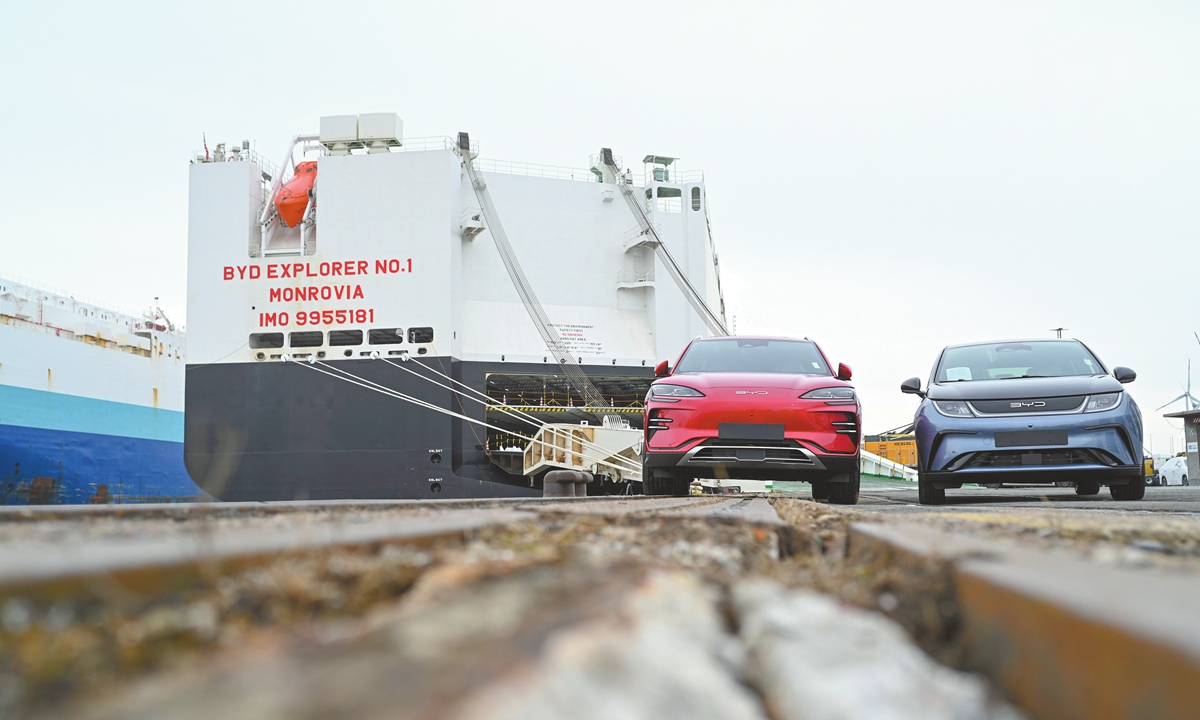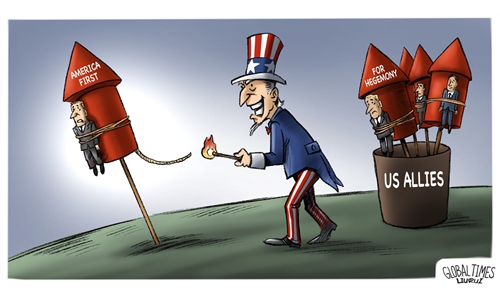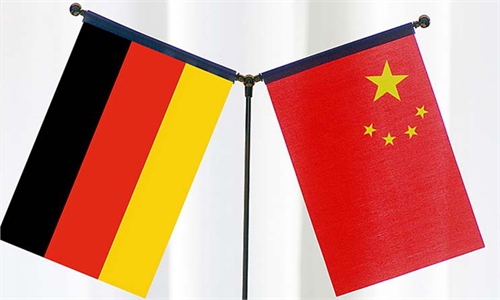EU risks losing credibility by obstructing Chinese EVs that could help achieve climate goals

Two new EVs of the Chinese car manufacturer BYD stand in front of the car freighter BYD Explorer No.1 in Bremen, Germany on February 26, 2024. Photo: CFP
Editor's Note:
After discussions and negotiations, the EU still decided to put up trade barriers by increasing tariffs on Chinese-made electric vehicles to as much as 45.3 percent. Michael Schumann (Schumann), chairman of the Board of the Federal Association for Economic Development and Foreign Trade, a German organization dedicated to promoting economic development and foreign trade, has voiced his opposition to this move. He recently stated that if the German people could set aside ideologies and politics to invite Chinese companies to collaborate more with Germany, they would be better off. In a written interview with Global Times (GT) reporter Li Aixin, Schumann shared further insights.
GT: In a past interview, you expressed opposition to the EU imposing tariffs on electric vehicles imported from China, stating that this sends the wrong signal at the wrong time. Could you elaborate on this?
Schumann: In the current tense economic situation in Germany, the last thing we need is to spark new trade conflicts. The German economy, in particular, as a former world export champion and still a leading global export nation, is threatened with massive damage from protectionism and sanction policies, which significantly endanger our economic substance in leading industries. These measures have been met with widespread disapproval and rejection across the board, from the government to industry and the general population.
The German Federal Government seeks fair competition, but not a trade war with tariffs, and has therefore voted against their implementation. Consumers also have a clear position here. According to a German Automobile Club survey, nearly 60 percent of respondents would consider purchasing a Chinese car model, and up to 80 percent would consider buying an electric vehicle.
Against the backdrop of stagnating or even non-existent mobility transition in Germany, this situation makes no sense in terms of transport policy. In order to achieve the climate protection targets in the transport sector, at least 15 million fully electric cars must be on Germany's roads by 2030. We are still a long way from achieving this target. It was reported that as of July 1 this year, just 1.52 million fully electric cars were registered in Germany.
Chinese suppliers are injecting a new, urgently needed dynamic into the electromobility market, which also extends to charging infrastructure and battery technology. The provision of a more diverse range of affordable electric vehicles for German consumers will furthermore sustainably increase the acceptance of electromobility in our country. In the field of electromobility, competition from China can drive innovation and enable manufacturers to improve their electric vehicles while reducing costs, ultimately benefiting consumers. Only in this way will Germany be able to fulfill its climate protection targets in the transport sector. We should therefore not allow the concept of risk to gain the upper hand, especially in the cooperation between Germany and China in the field of electromobility. We will be better off if we recognize China's contribution to the mobility transition in Germany.
GT: German Chancellor Olaf Scholz recently criticized the EU's decision to impose hefty tariffs on Chinese-made electric cars during a speech to the German parliament. Countries like Hungary and Spain also oppose these tariffs. What do you think these voices represent?
Schumann: Hungary and other countries, especially in Southern, Central and Eastern Europe, benefit disproportionately from Chinese electromobility investments, particularly in the supplier industry, which is strongly based there. This is also the reason why Slovakia and Slovenia voted against the implementation. The completely disproportionate measures taken by the US are pure protectionism in the course of the election campaign for the White House. However, the EU should not be guided by this in its long-term decision-making processes. The EU would also lose credibility if it had been pushing the electric car by all means for years for reasons of climate protection, but now it has obstructed foreign suppliers who could contribute to the realization of the proclaimed targets. It is therefore a matter of balancing national and common interests within the EU, which is difficult enough in itself. Different points of view are legitimate, but the geopolitical exaggeration, ideological approaches and the pressure from the US do not help.
GT: What impact will the EU's higher tariffs on electric vehicles imported from China have on the EU's electric vehicle industry?
Schumann: They not only affect Chinese manufacturers, but also, for example, German manufacturers that produce in China. The manufacturers will have to pass the surcharges on to the customers, resulting in price increases when the opposite would actually be necessary to increase acceptance. The automotive industry is more concerned about high electricity prices and bureaucracy due to legal requirements than fair competition with foreign manufacturers in the domestic market. The passenger car market as a whole is also weakening due to high inflation and political uncertainty. However, sales of electric cars have fallen particularly sharply.
The European automotive industry could be severely affected by potential Chinese countermeasures. This is poison for the industry at a difficult time for the economy, when massive investment in research and development would actually be appropriate.
GT: Will the electric vehicle dispute between China and Europe spill over into other areas of their economic and trade relations? What measures can be taken to prevent similar disputes from arising in the future?
Schumann: This danger is real and concrete. So far, China has reacted quite cautiously, for example with the tariffs on European brandy which mainly affect producers from France and Spain, but this could change quickly. The countermeasures in the food retail sector must be taken seriously by the EU. Diplomacy instead of confrontation must once again become a principle of EU trade policy.
The recommended approach is to strengthen the continuous dialogue mechanism, implement ideological and rhetorical disarmament measures, and increase more exchanges at all levels on potentially critical issues.
GT: You recently raised an idea that if Germany could set aside ideologies and politics, and invite companies like Huawei, BYD, Alibaba and even China Railway to collaborate more with Germany, people in Germany would be better off than today and could concentrate again on being a country of ideas, a country of research and a country of innovation.
Schumann: This applies not only to Germans, but to the people in Europe in general. We need a policy that serves the people and we urgently need to disarm ideologically and counter the perception that China is a threat.
GT: Are there other people in Germany who share your viewpoint?
Schumann: There are quite a few people in business and politics in Germany and Europe who think similarly, but they are not yet the majority and many prefer not to speak out publicly in the current heated atmosphere, in which the American-influenced media in the West are constantly portraying China as an enemy. However, the trend in Germany, as in many other European countries, shows that people in Europe want a different political approach. It will take a few more years before this is reflected in the election.



